"Being honest about the past is the only way to start to address the prejudices of the present."- David Lascelles, the current Earl of Harewood
'Brutality built this house'
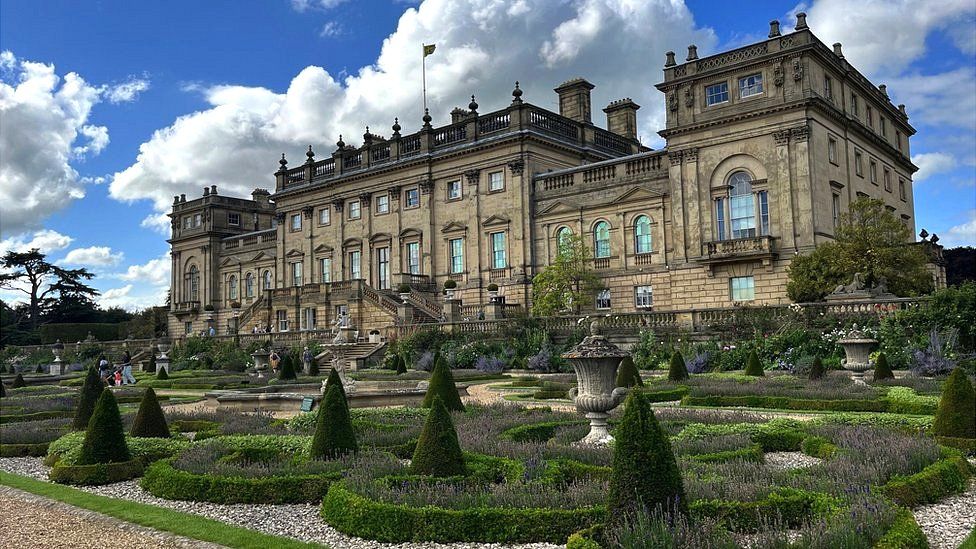
‘Delving into a deeply unsettling chapter of history and seeking to reshape the discourse, a groundbreaking report, Reparations for Transatlantic Chattel Slavery in the Americas and the Caribbean, has calculated that Britain owes a staggering sum of £18.6tn. Other nations with a legacy of slaveholding, such as the US, Portugal, Spain and France, also stand accused of owing trillions. The total economic toll is thought to be as high as $131tn (£103tn). The revelation lays bare the enduring ramifications of the transatlantic slave trade and the struggle for reparative justice on a global scale…’-Continue to read
The Demerara rebellion: 18–20 August 1823
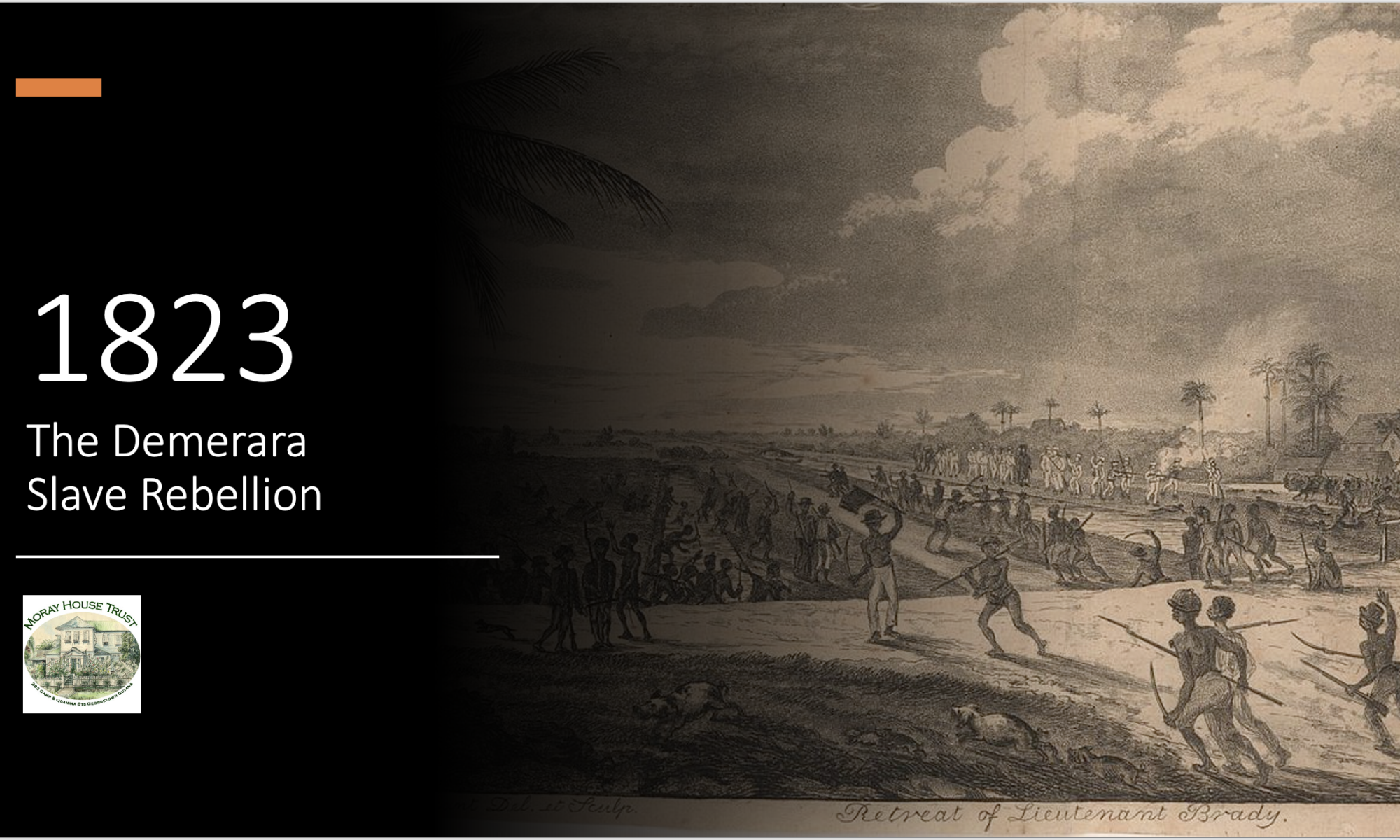
Photo Credit : Moray House Trust
‘About 13,000 Africans rose up in Demerara, a British colony that later became part of Guyana. Conditions for the enslaved were particularly brutal there. The plantations were the most profitable in the British empire, with an enslaved person in Demerara worth twice that of one in Jamaica.
‘They worked barefoot and endured terrible conditions,... “There was terrible pain, suffering and isolation, families were split up and sold. It was horrendous.”
‘Rape, violence and brandings were daily occurrences. African culture was suppressed, life expectancy short.
John Gladstone: The Hero of the Rebellion
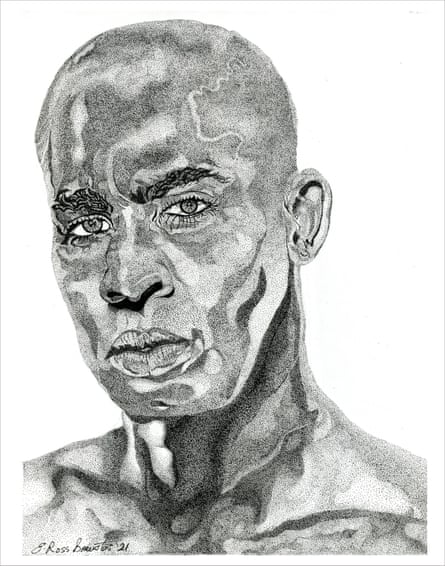
Jack Gladstone, who led the Demerara Rebellion. Illustration: Errol Ross Brewster via the Guardian
‘The rebellion began on John Gladstone’s plantation Success, with the peaceful goal of securing better working conditions. Led by enslaved African Jack Gladstone, it quickly spread across the province and eventually about 13,000 Africans rose up on 60 plantations.
‘Although few of the white planters were harmed, the revolt was met with brutal repression. On 20 August, 200 enslaved Africans were killed by British soldiers under the command of Lt Col John Leahy, a veteran of the Napoleonic wars. He ordered his troops to open fire when 2,000 rebels refused to disperse, an event that turned the tide against the rebels.
‘Jack’s father, Quamina, was captured, killed and hung in chains outside the plantation. Others were tortured to death and decapitated, their heads speared on to poles as a warning to others. Jack was spared and exiled to St Lucia, but no record of his arriving there has been found…’- The Observer, 20 August 2023
Must-read Books: The history they don’t want you to know
Photo: Amazon
Books that clearly show the magnitude of dishonesty and tragedy of education in Britain: An education that so manifestly and clearly fails to tell and teach the truth to today’s generation about how much of their country’s ‘greatness’ is owed to the exploitation of enslaved people and the plundering of their land and resources. Very shameful one can say.
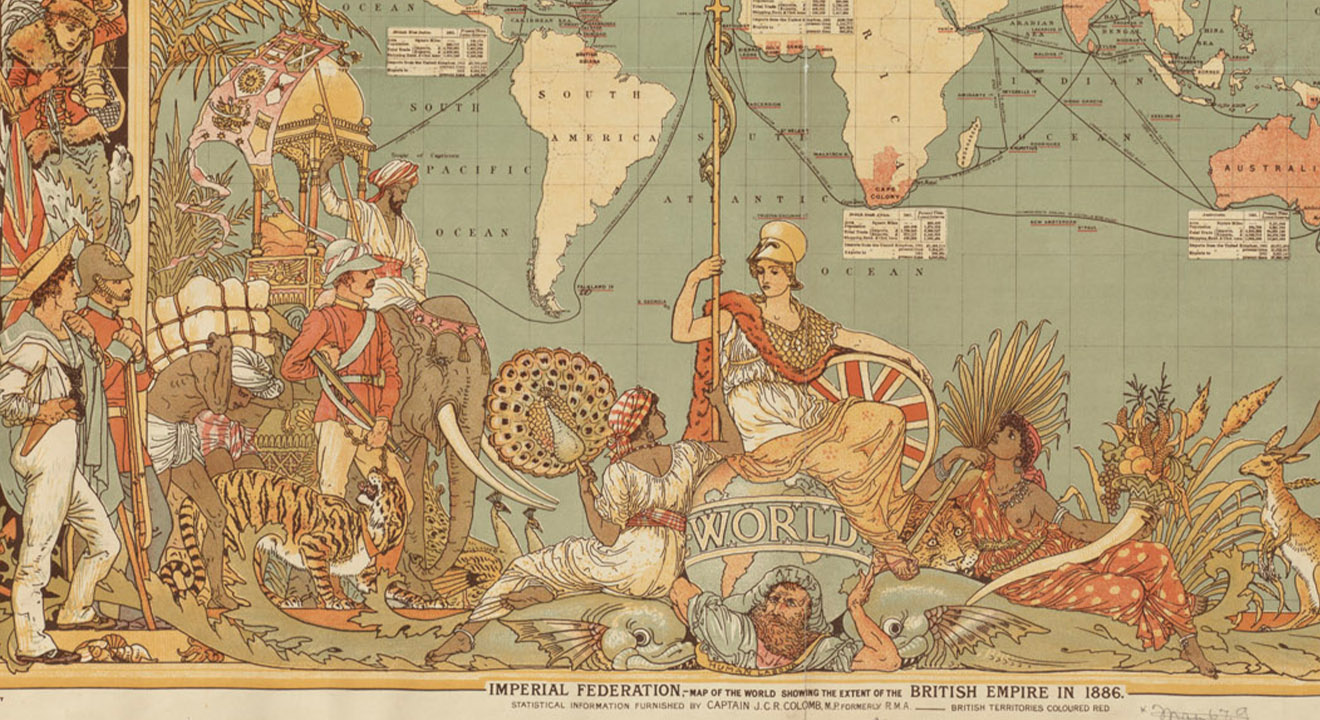
‘...From the development of mass education in England a century and a half ago, there has been a dismal failure at all educational levels to alleviate ignorance and xenophobia and teach honestly about the British Empire, the worldwide looting of land and labour, and the barbarous cruelties that accompanied the glorification and triumphal displays of military might and economic power. Schools and textbooks were always largely places of myth-making and evasions from the truth. Until the 1970s, maps of the world still had large sections coloured pink because the countries ‘belonged to us’. A glossy text on The Victorians selling in 2020 presents the ‘British Empire as the largest the World has ever seen’ complete with the well-known 1886 map with Britannia on her throne, military men in uniforms and the inevitable bare-breasted ‘native’ women. For years, legends of imperial triumphs and conquests formed the basis for a widespread belief in a superior British heritage, and all school subjects, especially geography, history, literature and religious studies were imbued with imperial values…’- Sally Tomlinson*, Emeritus Professor at Goldsmiths London University and an Honorary Fellow in the Education Department, University of Oxford.
And as I had noted elsewhere:
Friends,
If we are serious, if we really mean that we are shocked by what we are witnessing all around us, crisis after crisis, then, with all honesty, the time is now to ask WHY all these crimes against humanity all across the world?
For sure, there are many reasons for this. But to my mind, the main culprit is our dishonest, values free education. I have been blessed to have been involved in education for over four decades, not in one country, but in many places in the world.
Friends,
Our education, teaching and learning environment has obfuscated the truth, especially the historical truth:
Where in the curriculum, or in the classroom, is there any sign of a meaningful attention to TRUTH and HONESTY when it comes to addressing and a better understanding of subjects such as:
Colonisation, slavery, racism, imperialism, pseudo democracy values, poverty, inequality, plundering of other nations and peoples' land and wealth, plundering of land and natural resources, everywhere, causing environmental degradation and disasters, all in the interest of a pseudo economic ideology (neoliberalism), profit maximisation and cost minimisation, socialism for a few and capitalism for the many?
Why is that the great majority of the population in the west are totally unaware of what crimes their governments have been up to in other people’s land?
Why is it that hardly anybody in Britain knows anything about the history of their country’s actions in my land of birth, Persia, the modern Iran, for example? An example, amongst many I could have mentioned!
Why is it that hardly anybody knows anything about perhaps the most well known oil company in the world, B.P (British Petroleum), the former Anglo-Iranian Oil Company, and still further the former Anglo-Persian Oil Company?
Why is it that nobody knows anything about the riches that Britain got from Iran, in what Churchill had termed, ‘Pennies from Heaven’, enabling the British navy to rule the seas, maintaining, and nourishing the British Empire!
And then, as a token of their thanks to the people of Iran for all Britain had made from Iranian oil, Britain with the help and support of their former colony, the US, staged the first CIA/MI6 coup d'état against the democratically elected Prime Minister Mohammad Mosaddegh. A crime against humanity and international law that has pushed back the dream of democracy in Iran, if not for ever, but at least for generations to come.
Friends,
To my mind, in contrast to what some people might argue ignorance is a bliss, for me, it is a very destructive vice that seeks to destroy humanity. Ignorance imprisons the mind and makes one vulnerable to exploitation and humiliation. This is why I strongly believe that unless we discover the key to truthfulness and total honesty in our schools, high schools and universities, and teach accordingly, then, nothing will change. Crimes after crimes will be done in our name, again and again, as they have been done in the past…’-A Reflection on a World in Crises, Imbecile leadership and the Failure of Education to Educate and Inform
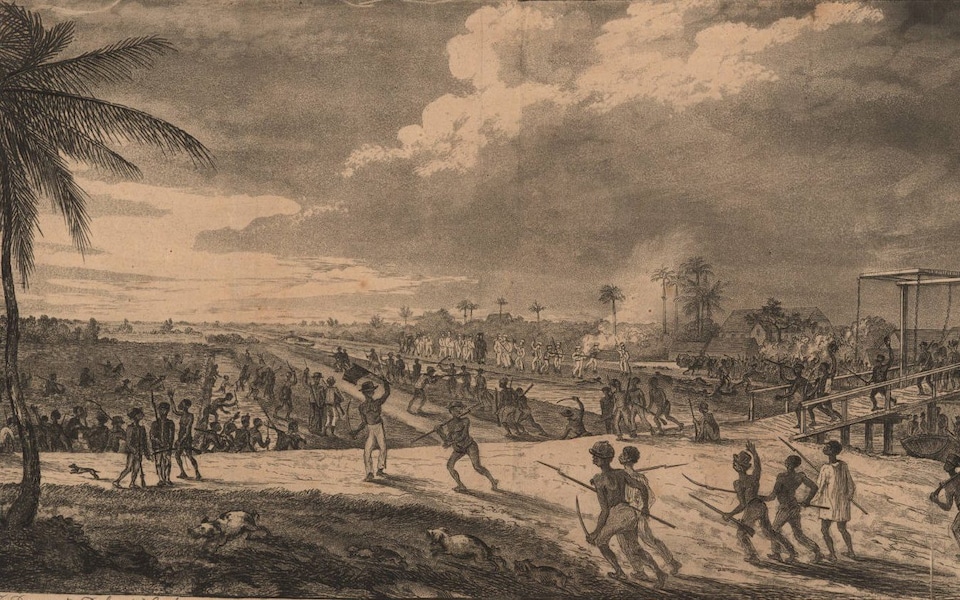
Engraving by Joshua Bryant of the August 1823 slave uprising in the British colony of Demerara
'WHITE DEBT is a timely, pioneering, game changer. Its compelling narrative and thought-provoking reflections enable us to (re)visit plantation slavery with fresh eyes. It invites the reader to reflect on a core period of British history that has for too long been ignored or dismissed as bearing no relationship to present-day inequities that exist between White and Black people. This book is compulsory reading for anyone interested in understanding the case for reparations and will delight readers who are tired of portrayals of enslaved Africans as marginal to the history of abolitionism. WHITE DEBT is a courageous tour de force.'-- JUANITA COX, co-founder of Guyana Speaks
'The Demerara episode graphically reveals the hidden cruelties of colonialism, not to mention British myopia towards the atrocities. Harding tells the story with impressive drama and detail.' ―THE TIMES
'Authentic, bold and poignant, WHITE DEBT is a captivating tale of resistance and an urgent antidote to our collective amnesia.'-- DAVID LAMMY MP
'Honest, compelling and certainly timely, WHITE DEBT lays bare the nature of a crime against an entire race of people, for which there was no punishment. As Thomas Harding has done, all readers should consider; what is my part in the wider story of the British slave trade and how do I make amends where necessary?'-- ELSIE HARRY, African-Guyanese Activist & Poet
'I was much moved by WHITE DEBT. I am so glad Thomas Harding wrote it. He tells the story of Britain's appalling role in slavery with great sensitivity and leads the reader to the only possible conclusion, that there is a debt and it must be paid.'-- RABBI JULIA NEUBERGER
‘When Thomas Harding discovered that his mother's family had made money from plantations worked by enslaved people, what began as an interrogation into the choices of his ancestors soon became a quest to learn more about Britain's role in slavery. It was a history that he knew surprisingly little about - the myth that we are often taught in schools is that Britain's role in slavery was as the abolisher, but the reality is much more sinister.
In WHITE DEBT, Harding vividly brings to life the story of the uprising by enslaved people that took place in the British colony of Demerara (now Guyana) in the Caribbean in 1823. It started on a small sugar plantation called 'Success' and grew to become a key trigger in the abolition of slavery across the empire. We see the uprising through the eyes of four people: the enslaved man Jack Gladstone, the missionary John Smith, the colonist John Cheveley, and the politician and slaveholder John Gladstone, father of a future prime minister. Charting the lead-up to the uprising right through to the courtroom drama that came about as a consequence, through this one event we see the true impact of years of unimaginable cruelty and incredible courage writ large.
Captivating, moving and meditative, WHITE DEBT combines a searing personal quest with a deep investigation of a shared history that is little discussed amongst White people. It offers a powerful rebuttal of the national amnesia that masks the role of the British in this devastating period, and asks vital questions about the legacy we have been left with - cultural, political and moral - and whether future generations of those who benefited from slavery need to acknowledge and take responsibility for the White Debt.’-- Buy the book HERE
White Debt by Thomas Harding review – the history they didn’t want you to know
Nesrine Malik Via The Guardian
‘A brilliant account of the Demerara uprising, a key piece of the jigsaw puzzle that is Britain’s relationship to slavery.’
‘The word Demerara probably means nothing to you, other than being the name of a large-grained golden brown sugar. But Demerara is a place, or it was. Part of what is now called Guyana, Demerara was a British territory rich in sugar plantations. It was one of the most lucrative colonies, owing to the high yield of the land and high productivity of the enslaved people who worked on it, productivity extracted via exceptional brutality. The enslaved outnumbered the white colonists significantly, so it was thought that their treatment needed to be particularly harsh, so as not to encourage rebellion. That came anyway, in 1823. Thomas Harding tells the story of one of the lesser known uprisings of the colonial era, but his book is not just a work of narrative nonfiction, it is an attempt to illustrate that Britain needs to acknowledge the country’s “white debt”, how much of its greatness it owes to the exploitation of enslaved people…’- Continue to read
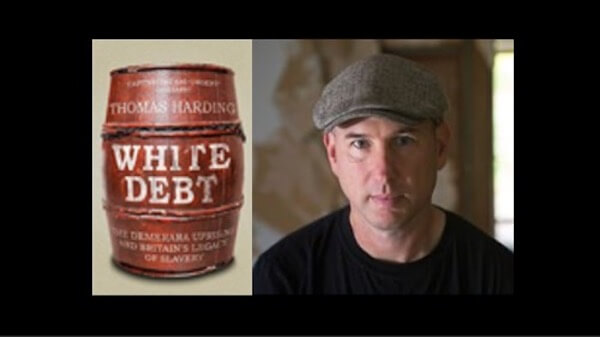
Photo: Circle Sq
My family benefited from slavery. Why can’t we accept white people still owe a huge debt?
By Thomas Harding
‘Many things were remarkable about the trial of the Colston Four, who last week were found not guilty of criminal damage for pulling down the statue of the 17th-century slave trader Edward Colston and throwing it into Bristol harbour. Among them was the fact that the four defendants were white, as was the judge and, reportedly, most of the jurors. It made me wonder, are white people increasingly recognising the significance of Britain’s legacy of slavery?
In my view, white people in Britain have a special responsibility when it comes to this legacy. After all, the vast majority of those who transported the captured Africans to the Caribbean were white. Similarly, the vast majority of those who “bought” these enslaved people and made them work on the appalling sugar, cotton and coffee plantations were white. The same is true of the shipowners and sailors, bankers and insurance officers, traders, dockworkers, shopkeepers and countless others involved in selling the commodities back in Britain. This includes my own family, who made money importing tobacco from American and Cuban plantations that were worked on by enslaved people. As to the general population who gained from the enormous wealth that poured into Britain on the back of slavery, again the vast majority were white…’- Continue to read
Another Must-read Book to Debunk What We Have Been Told About Slavery

Photo: Amazon
‘In 1807, Parliament outlawed the slave trade in the British Empire, but for the next quarter of a century, despite heroic and bloody rebellions, more than 700,000 people in the British colonies remained enslaved. And when a renewed abolitionist campaign was mounted, making slave ownership the defining political and moral issue of the day, emancipation was fiercely resisted by the powerful 'West India Interest'. Supported by nearly every leading figure of the British establishment - including Canning, Peel and Gladstone, The Times and Spectator - the Interest ensured that slavery survived until 1833 and that when abolition came at last, compensation worth billions in today's money was given not to the enslaved but to the slaveholders, entrenching the power of their families to shape modern Britain to this day.
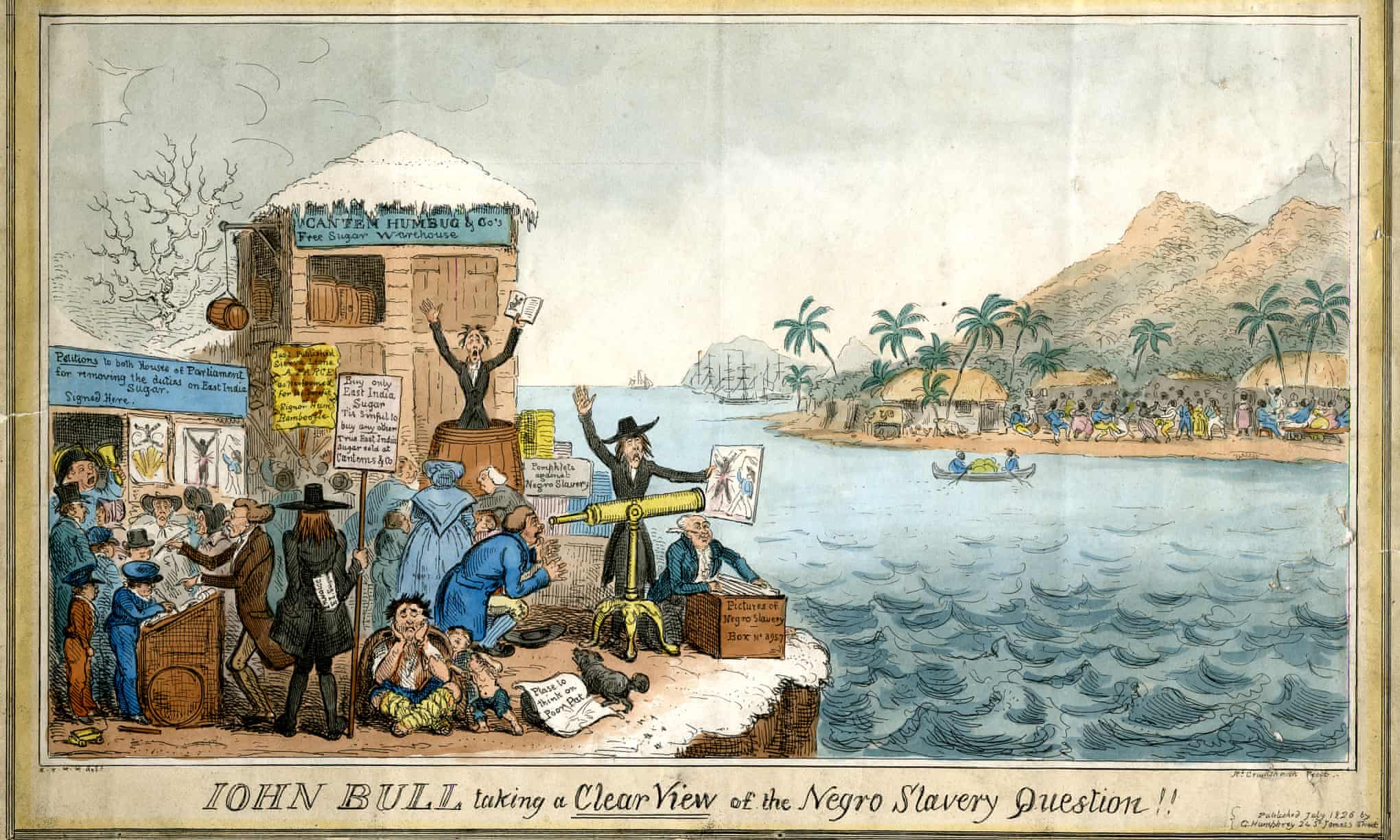
Illustration by Isaac Robert Cruikshank from July 1826. Photo: Wilberforce House Museum/Via The Guardian
'Drawing on major new research, this long-overdue and ground-breaking history provides a gripping narrative account of the tumultuous and often violent battle - between rebels and planters, between abolitionists and the pro-slavery establishment - that divided and scarred the nation during these years of upheaval. The Interest reveals the lengths to which British leaders went to defend the indefensible in the name of profit, showing that the ultimate triumph of abolition came at a bitter cost and was one of the darkest and most dramatic episodes in British history.’- Buy The Interest by Michael Taylor HERE
See also:
‘Groundbreaking work on slave economy finally back on UK shelves.’
Seminal work by scholar and future politician Eric Williams, rejected 80 years ago, to be republished in Britain
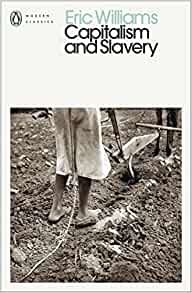
Photo: Amazon
‘In 1938, a brilliant young Black scholar at Oxford University wrote a thesis on the economic history of British empire and challenged a claim about slavery that had been defining Britain’s role in the world for more than a century.
But when Eric Williams – who would later become the first prime minister of Trinidad and Tobago – sought to publish his “mind-blowing” thesis on capitalism and slavery in Britain, he was shunned by publishers and accused of undermining the humanitarian motivation for Britain’s Slavery Abolition Act. It was not until 1964 that the work found a publisher in the UK, but it has been out of print here for decades.
Now, 84 years after his work was rejected in the UK, and 78 years after it was first published in America, where it became a highly influential anti-colonial text, a new edition of Williams’s book, Capitalism and Slavery, is to be published in Britain…’- Continue to read
Buy Capitalism and Slavery HERE
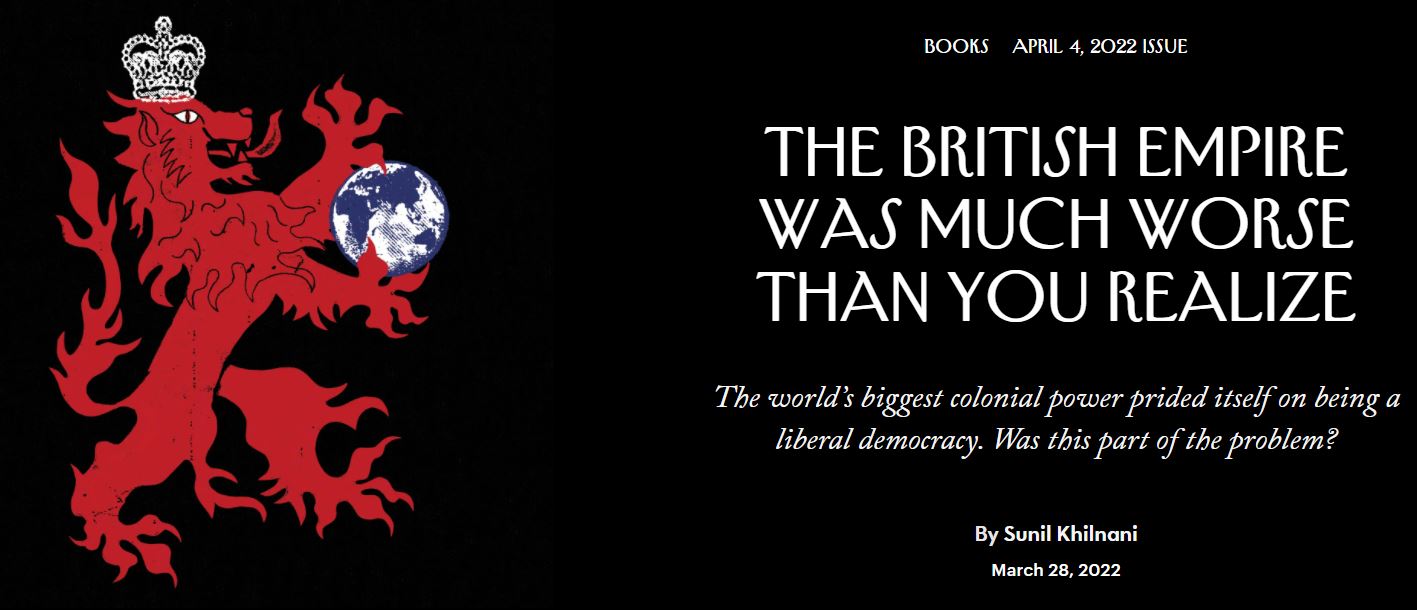
Photo: The New Yorker
The British Empire Was Much Worse Than You Realize
'Britain’s shameful slavery history matters – that’s why a jury acquitted the Colston Four'
By David Olusoga
‘Jurors were asked to rule that Edward Colston’s heinous crimes were immaterial,
but they chose to put themselves on the right side of history.’
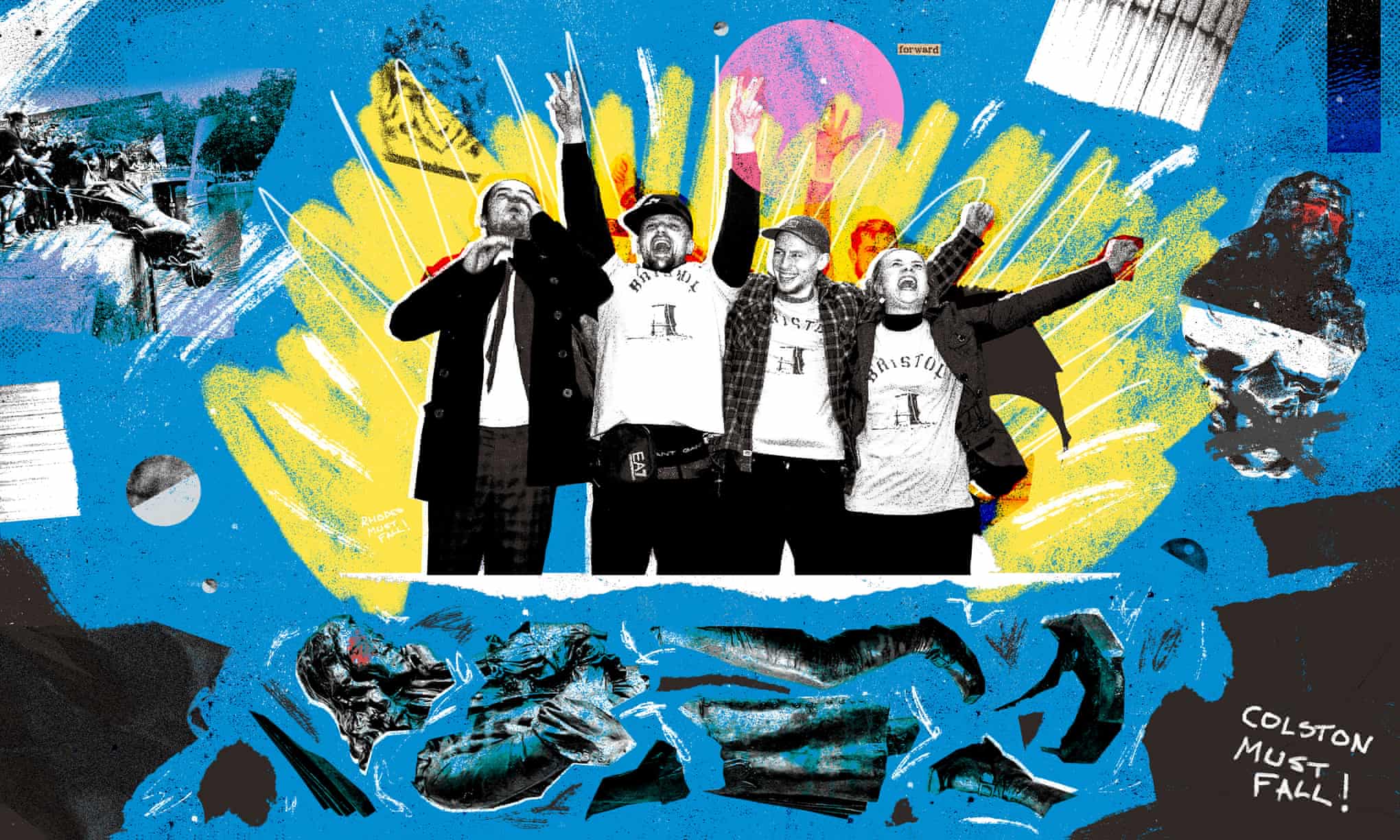
Illustration by Nate Kitch/ Via The Guardian
‘There were cheers from the public gallery of Bristol crown court when the verdicts of not guilty were returned. Eighteen months after Bristol’s now infamous statue of the slave trader Edward Colston was sent crashing to the pavement, the four young people who had been charged with criminal damage were acquitted.
The strategy that the prosecution appears to have adopted – in a case that some now argue should never have been brought to trial – seemed to centre on asking that the jury be blind to history. Who the statue venerated, they argued, was irrelevant. This, they claimed, was an open-and-shut case of criminal damage, one in which the defendants did not even deny their role in the toppling of the statue or, in one case, helping to roll it to Bristol harbourside, from where it was cast into the water.
The contention of the prosecution was that the crimes of Edward Colston, shareholder and ultimately deputy governor of the Royal African Company, the most prolific slave-trading entity in British history, should simply be set aside. That the statue depicted a man whose wealth was based on the enslavement of 84,000 men, women and children was immaterial. As was the fact that he was complicit in the deaths of 19,000 of them, who died, squirming in agony, chained to the decks of the Royal African Company’s slave ships. That should be of no concern to the jury. Their suffering, their deaths, their very existence was irrelevant to the issue at hand. In adopting such a strategy the prosecution was merely asking the jury to occupy the same stance of wilful, moral blindness that Colston’s defenders have occupied for decades…’- Continue to read
Education for honesty and honesty in Education
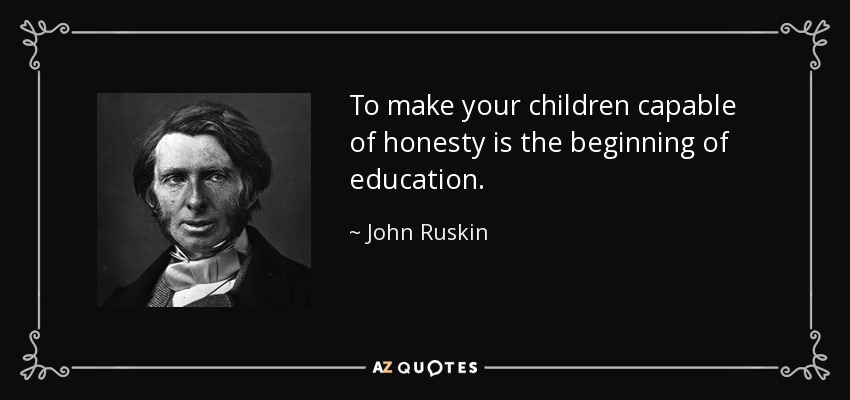
*Rule Britannia? Education for honesty
*Education and Race from Empire to Brexit
We Refugees: I am told I have no country now
Brexit, Trump and the failure of our universities to pursue wisdom
Neoliberalism destroys human potential and devastates values-led education
The rise in global fascism: A failure of education?
The Moral Blindness of the English Posh Boys
Why is the world like a house of cards falling apart?
Envisioning the Future of our Children’s Education
The Value of Values: Values-led Education to Make the World Great Again
Nature the Best Teacher: Re-Connecting the World’s Children with Nature
Detaching Nature from Economics is ‘Burning the Library of Life’
'Nature and Me'-Part I: Educating the Heart and the Soul of Children to Build a Better World
The heart and the soul of education is wisdom
Wisdom and the Well-Rounded Life: What Is a University?
The New Decade is upon us: We all have a responsibility to make the world a better place
Desperately seeking Sophia: The Wisdom of Nature
A timeless reflection on two types of teaching and learning
What They Forget to Teach You at School’: Fix Education to Fix the World
My Economics and Business Educators’ Oath: My Promise to My Students
A timeless reflection on two types of teaching and learning
Land As Our Teacher: Rhythms of Nature Ushering in a Better World
Poetry is the Education that Nourishes the Heart and Nurtures the Soul
What if Universities Taught KINDNESS?
Wouldn’t the world be a better place with a bit more kindness? Harnessing the Economics of Kindness
‘I have a Dream’, 57 Years On and Why We Must Carry on Imagining the Dream
Eurosceptics should visit Coventry Cathedral: The EU's Higher Purpos
The World would be a Better Place if Economists had Read This Book
Britain today and the Bankruptcy of Ideas, Vision and Values-less Education
The Time is Now for Values-led Education to Make the World Truly Better and Great Again
Why should we all become mother nature and sacred earth guardians
On the 250th Birthday of William Wordsworth Let Nature be our Wisest Teacher
Mother Earth is Crying: A Path to Spiritual Ecology and Sustainability
Biomimicry: Learning from Nature
To Heal the World and People We Need to Save the Commons from Plunder
Are you physically and emotionally drained? I know of a good and cost-free solution!
‘What They Forget to Teach You at School’: Fix Education to Fix the World
Happy Teachers, Happy Pupils, Happy Schools, Better Education, Better Lives, Better World
A Sure Path to build a Better World: How nature helps us feel good and do good
On the 250th Birthday of William Wordsworth Let Nature be our Wisest Teacher
In a world that seems so troubled, how do we hold on to hope?
The beauty of living simply: the forgotten wisdom of William Morris
The Time is Now for Values-led Education to Make the World Truly Better and Great Again
Towards COP26: Education to Heal the World
Make COP26 The Dawn of a New Beginning
Environmental Crisis, Hope and Resilience: A Pick from our GCGI Down to Earth Archive
Crisis after Crisis: Ten Steps to Save the World
GCGI is our journey of hope and the sweet fruit of a labour of love. It is free to access, and it is ad-free too. We spend hundreds of hours, volunteering our labour and time, spreading the word about what is good and what matters most. If you think that's a worthy mission, as we do—one with powerful leverage to make the world a better place—then, please consider offering your moral and spiritual support by joining our circle of friends, spreading the word about the GCGI and forwarding the website to all those who may be interested.
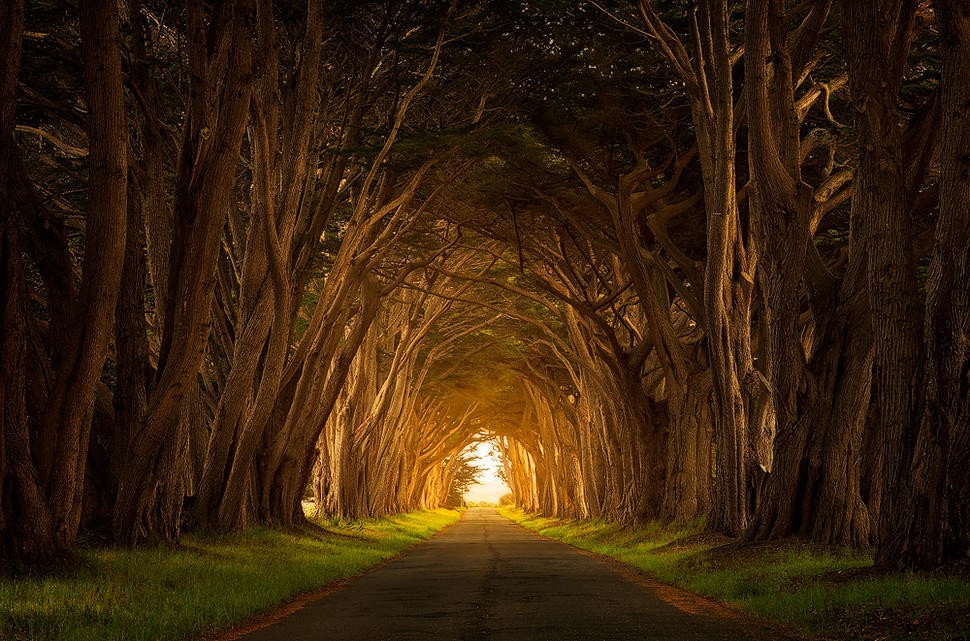
Light at the end of the tunnel.- Ryan Engstrom
